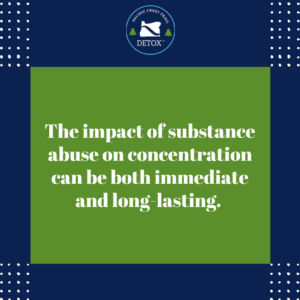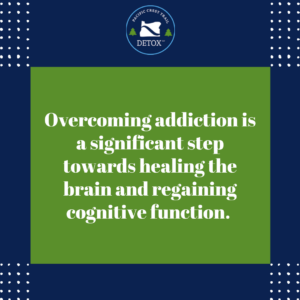In our fast-paced world, concentration is critical — but what happens when addiction starts to erode your ability to focus? Whether you’re dealing with substance abuse or behavioral addictions, habits linked to addiction can disrupt your brain’s ability to pay attention and process information. Let’s explore how addiction can affect your concentration and discover strategies to help you regain your focus.
Understanding Concentration and Cognitive Function
Concentration is the ability to direct our thoughts and attention toward a specific task or subject. It’s an essential skill that supports everything from studying for exams to completing work projects. Without concentration, learning, remembering information, or making sound decisions is difficult. A high level of concentration can also contribute to overall mental health and well-being, reducing stress and improving mood.
The brain plays a pivotal role in maintaining focus and attention. Several brain regions work together to regulate concentration. The prefrontal cortex, located at the front of the brain, is particularly important for executive functions like planning, decision-making, and controlling impulses. It helps us stay on task and resist distractions.
The reticular activating system (RAS), a network of neurons located in the brainstem, plays a crucial role in arousal and alertness. It helps filter out irrelevant information and keeps us focused on tasks.
How Addiction Disrupts Concentration
Substance abuse can wreak havoc on the brain, leading to a myriad of cognitive impairments. Different substances have varying effects on brain chemistry. For instance, stimulants like cocaine and methamphetamine can increase dopamine levels, leading to heightened arousal and decreased attention span. Opioids can reduce brain activity, causing sluggishness and difficulty concentrating. Alcohol withdrawal can cause brain fog in other cases.
The impact of substance abuse on concentration can be both immediate and long-lasting. Short-term effects may include difficulty staying on task, forgetfulness, and impaired decision-making. Over time, repeated substance use can lead to more severe cognitive deficits, such as difficulty learning new information, problems with memory, and even changes in brain structure.
Specific Substances and Their Effects on Concentration
Various substances can affect concentration. Here are the most common ones that people use.
Alcohol. Despite its initial relaxation, alcohol impairs cognitive abilities, including concentration. Short-term effects include reduced inhibitions and difficulty focusing. Long-term abuse can cause brain damage and cognitive decline.
Stimulants (e.g., cocaine, methamphetamines). Stimulants initially provide heightened focus, but this is followed by a crash. The brain becomes accustomed to the increased dopamine levels, leading to tolerance and dependence. This makes it difficult to concentrate without the substance, and the crash period can be accompanied by severe fatigue, depression, and difficulty focusing.
Opioids. Opioids can dull the senses, reduce alertness, and impair attention. Long-term opioid abuse can lead to brain changes that affect memory, learning, and decision-making, making it difficult to concentrate.
Cannabis. While moderate cannabis use may have minimal effects, heavy or chronic use can impair cognitive functions. Cannabis can interfere with memory, learning, and problem-solving abilities, making it difficult to stay focused.
The Vicious Cycle: Addiction and Decreased Productivity
The inability to concentrate can significantly hinder productivity in all aspects of life. Lack of focus at work can lead to errors, missed deadlines, and decreased efficiency. Students may struggle to retain information, complete assignments, and perform well on exams.
In daily life, reduced concentration can make it difficult to manage tasks, maintain relationships, and enjoy hobbies. The addiction that causes a lack of concentration may even cause withdrawal symptoms that further get in the way of life.
The emotional toll of reduced concentration can also be substantial. The frustration and self-doubt that often accompany difficulty focusing can contribute to increased anxiety and depression. The feeling of being overwhelmed and unable to cope can lead to feelings of hopelessness and isolation. Additionally, the social and occupational consequences of reduced concentration can further exacerbate mental health issues.
Recovery and Rebuilding Concentration
There are several ways one can break the addiction cycle to recover and rebuild their concentration.
Detox and Brain Recovery
Overcoming addiction is a significant step towards healing the brain and regaining cognitive function. A process called detoxification is part of addiction treatment. It eliminates harmful substances from the body and allows the brain to begin to repair itself. As the brain heals, it can regain its ability to focus and concentrate. It’s important to note that brain recovery can take time, and the extent of damage caused by addiction may vary. An experienced detox team can help you in your recovery journey.
Cognitive Behavioral Therapy (CBT)
Cognitive Behavioral Therapy (CBT) is a valuable tool for helping individuals who have overcome addiction retrain their brains to focus and improve concentration. CBT focuses on identifying and challenging negative thought patterns that may be contributing to concentration difficulties. By learning new coping strategies and developing healthier thought patterns, you can improve your ability to focus and manage your emotions.
Healthy Habits
Adopting healthy lifestyle habits can significantly support concentration during recovery. Regular exercise has been shown to improve cognitive function and boost mood. A balanced diet provides the nutrients necessary for brain health and can help to enhance concentration. Getting enough sleep is essential for optimal brain function and can help to improve focus and attention. Additionally, stress management techniques, such as meditation or mindfulness, can help to reduce anxiety and improve concentration.

Conclusion
Addiction can affect our ability to concentrate. By understanding how different substances impact the brain, we can take steps to prevent and address these issues. Seeking compassionate detox care and treatment through detoxification, therapy, and lifestyle changes can be crucial for overcoming addiction and regaining our ability to focus and thrive. Remember, it’s never too late to seek help and start the journey towards recovery. If you or a loved one is looking for a personalized detox approach in Oregon, do not hesitate to reach out to us at Pacific Crest Trail Detox for help.



